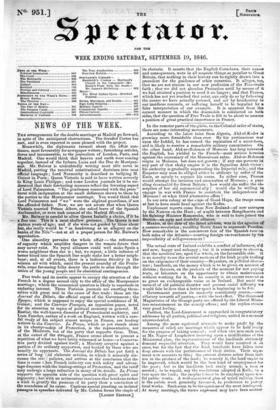Free trade and its merits appear to occupy the attention
of the French in a degree second only to the affair of the Montpensier marriage; which the economical question is likely to supersede in
interest. nterest. Three Parisian journals are exerting them- selves with great zeal in the cause of free trade: these are the Journal des Debats, the official organ of the Government ; the Epoque, which is supposed to enjoy the special confidence of M. Guizot; and the Courrier Francais, an opposition paper, noted for its attention to topics of political economy in general. M. Bastiat, the well-known dissector of Protectionist sophistry, and Leon Faucher, author of a work on England, written with a care- ful study of his subject almost unique in France, are leading writers In the Courrier. la Presse, which as yet stands alone in its champlenship of Protection, is the representative, not of the Ministers, %mit of the party that supports them. Thus, at the outset of the struggle, France seems about to present a repetition of what we have lately witnessed at home—a Conserva- tive party divided against itself; a Ministry arrayed against a portion of its ordinary supporters, and backed by those who are usually its opponents. The Journal des Debuts has put forth a series of long 1 ad elaborate articles, in which it minutely dis- cusses the 'iv: , policies, and arrives at the conclusion that the time is come hen French industry can with safety and advan- tage dispense with the leading-strings of Protection, and the tariff • may undergo a large reduction in many of its details. La Prase supports the opposite side of the question with great spirit and ingenuity; but with an acrimonious insolence that betokens rather a wish to gratify the passions of its party than a conviction of the soundness of its cause. Captious special pleading on isolated passages in speeches delivered by Mr. Cobden forms the staple of its rhetoric. It asserts that the English Corn-laws, their causes and consequences' were in all respects things so peculiar to Great Britain, that nothing in their history can be rightly drawn into a precedent for the guidance of other countries. It alleges, too, that we are not sincere in our new profession of the Free-trade faith ; that we did not abandon Protection until by means of it we had attained a position to need it no longer ; and that France, which has not yet reached that point, can only do so by following the course we have actually pursued, and not by hearkeninir to our insidious counsels, or suffering herself to be beguiled by a false interpretation of our example. It is apparent from the earnest manner in which the discusan is conducted on both sides, that the question of Free Trade is felt to be about to assume a position of great practical importance in France.


























